Christian Cameron’s historical acumen and narrative flair combine to give the reader a glimpse of what the life of a 14th Century knight – in moments of chivalry and occasional calumny – might have been like. Cameron makes opening the book truly feel like stepping through time and mingling in the ranks of those who sought to find improbable nobility even in the darkest moments of battle.
Blog
Home in Vancouver
After a ton of travel in 2025, I’m back in Vancouver for the winter! A few Vancouver facts for those of you who’ve yet to visit:
- Vancouver is so geographically dramatic that people regularly forget it’s a city and not a national park with Wi-Fi.
- It has one of the mildest winters in Canada, which residents proudly mention while quietly forgetting the nine straight months of rain.
- Real estate prices are high enough that “ocean view” often means “if you lean out the window and squint between two condos.”
- Vancouverites will happily drive two hours to hike a mountain, then complain bitterly about a 15-minute commute.
- The city has been “discovered” so many times (gold rushers, hippies, film crews, tech workers) that no one is entirely sure who was here first – or who can still afford to be.
Reading The Hallmarked Man
I’m a big fan of the Strike television show (I mean, Tom Burke and Holliday Grainger? I’d watch them reading out the phone book – all the while wondering if they’ll ever kiss). The books make for fun beach reading, full of intricate investigations interspersed with the never-ending “will they/won’t they” of Strike and Robin. At over 250K words, it’s a doorstopper . . .
Visiting Tunisia
Tunisia surprised me. A land where the stones remember Carthaginian walls still whispering of empires lost, Roman amphitheatres standing proud against the desert wind. In one day you can walk through millennia: Punic ruins at sunrise, magnificent mosaics by noon, and the echo of gladiators in El Djem by dusk.
But what lingers isn’t only the past but the people. Warm, curious, unflinchingly kind. In cafés and narrow streets you feel a quiet strength shaped by a remarkable, ongoing struggle for equality among themselves and freedom from a past shaped by endless tides of invaders.
#Tunisia #Travel #Carthage #HistoryLives
Exploring Castle Building
Guédelon Castle is one of the most astonishing places I’ve ever visited – a medieval fortress not preserved, but built from scratch using only 13th-century tools and techniques. Every stone, every beam, every rope is a lesson in patience and craft. You can watch blacksmiths forge nails beside masons shaping limestone blocks, hear the rhythmic strike of mallets echo through the forest, and realise how much knowledge the modern world has let slip.
#Guédelon #France #LivingHistory #Craftsmanship #MedievalEngineering
Reading The Ill-Made Knight
I never cease to be jealous of Christian Cameron’s[tag Christian Cameron] talent for blending authenticity with compulsive readability. The Ill-Made Knight is both an ode to the chivalric tradition and a poignant exploration of its flaws. William Gold is both heroic in his aspirations yet all too honest about his own failings. I heartily recommend this first book in what I’ve no doubt is a magnificent series.
Editing Our Lady of Blades
At long last, the novel that’s taken me seven years to write is almost ready for publication. Technically, I’m in the proofing stage, which should mean only checking for typos or continuity, but as my long-suffering publishers know full well, that never stops me from seriously revising a chapter here or there . . . or everywhere.
Visiting Dijon
Dijon is a city that feels like it’s been polished by centuries of quiet pride. Golden roofs, half-timbered houses, and the scent of mustard that’s somehow both comforting and regal. You can stroll through medieval streets where every corner reveals another spire, another café, another reminder that France once built beauty not for tourists, but for itself.
Writing the Path of Swords Book 1
Last year I was delighted to sign a three-book deal with the wonderful folks at aethon books . It’s been such a pleasure to create an entirely new world of fantasy that lurks in the shadows adjacent to our own with its own strange traditions and intricate swords-based magic system.
The Year of Secret Projects
Never in my career have I been involved in so many writing projects – not only my own, but collaborative ones with brilliant writers scheming to take over the world!
I can’t reveal too much yet, but expect some very cool announcements over the coming months. Here’s just a taste of what’s on my plate:
- A soon-to-be announced sci-fi novel with my good friend and fellow novelist, Kristi Charish (a proper scientist, thankfully!)
- The sequel to the unexpectedly successful Malevolent Seven. I sold the sequel largely on the promise of including a vampire kangaroo.
- A mind-blowing space opera created with some fantastic sci-fi writers who have written in some of the biggest media universes ever.
- A very cool book about swords in which I was honoured to write the introduction.
- A wild sci-fi adventure co-written with my friend W.G. Arndt (how did I suddenly end up involved in three different sci-fi projects when I failed high school physics?)
- Periodically consulting on the pitches and scripts for the Greatcoats TV series and Spellslinger TV series. Don’t get too excited yet, folks: these things take a long time to come together and most don’t make it past the pitch stage. Still . . . it would be awfully cool to have two different TV series on the air!
So, lots on the go and even more on the horizon. Now, back to the grindstone . . .
Heading to Dragon Con

My first time at the legendary Dragon Con in Atlanta, Georgia from August 29th to September 2nd!
Oddly, I was just in Atlanta earlier this year, but I’ll be returning at the end of August as a guest. Not sure yet of my panels and such, but presumably those should appear on the website soon.
Hope to see lots of friends and readers there!
The Phoenix Crown
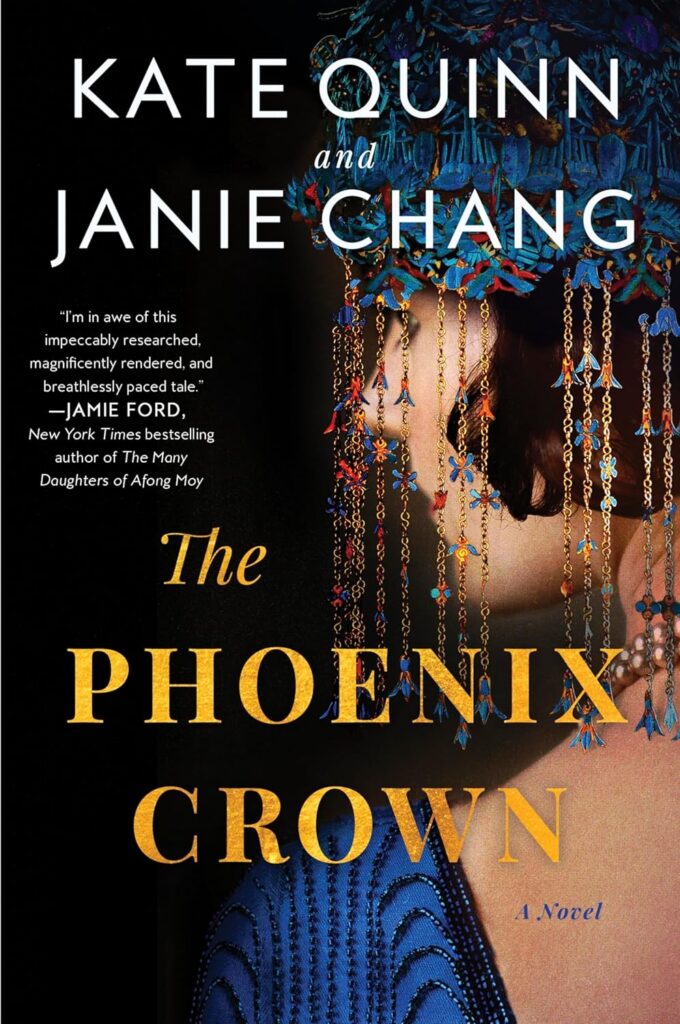
Despite the title, the Phoenix Crown isn’t a fantasy novel but rather a historical adventure set in 1906 San Francisco before and after the great earthquake. I’m a huge fan of Kate Quinn’s prose, so I’m always up for going on whatever journey she and Janie Chang have in mind.
From bestselling authors Janie Chang and Kate Quinn, a thrilling and unforgettable narrative about the intertwined lives of two wronged women, spanning from the chaos of the San Francisco earthquake to the glittering palaces of Versailles.
San Francisco, 1906. In a city bustling with newly minted millionaires and scheming upstarts, two very different women hope to change their fortunes: Gemma, a golden-haired, silver-voiced soprano whose career desperately needs rekindling, and Suling, a petite and resolute Chinatown embroideress who is determined to escape an arranged marriage. Their paths cross when they are drawn into the orbit of Henry Thornton, a charming railroad magnate whose extraordinary collection of Chinese antiques includes the fabled Phoenix Crown, a legendary relic of Beijing’s fallen Summer Palace.
His patronage offers Gemma and Suling the chance of a lifetime, but their lives are thrown into turmoil when a devastating earthquake rips San Francisco apart and Thornton disappears, leaving behind a mystery reaching further than anyone could have imagined . . . until the Phoenix Crown reappears five years later at a sumptuous Paris costume ball, drawing Gemma and Suling together in one last desperate quest for justice.
Writing Our Lady of Blades
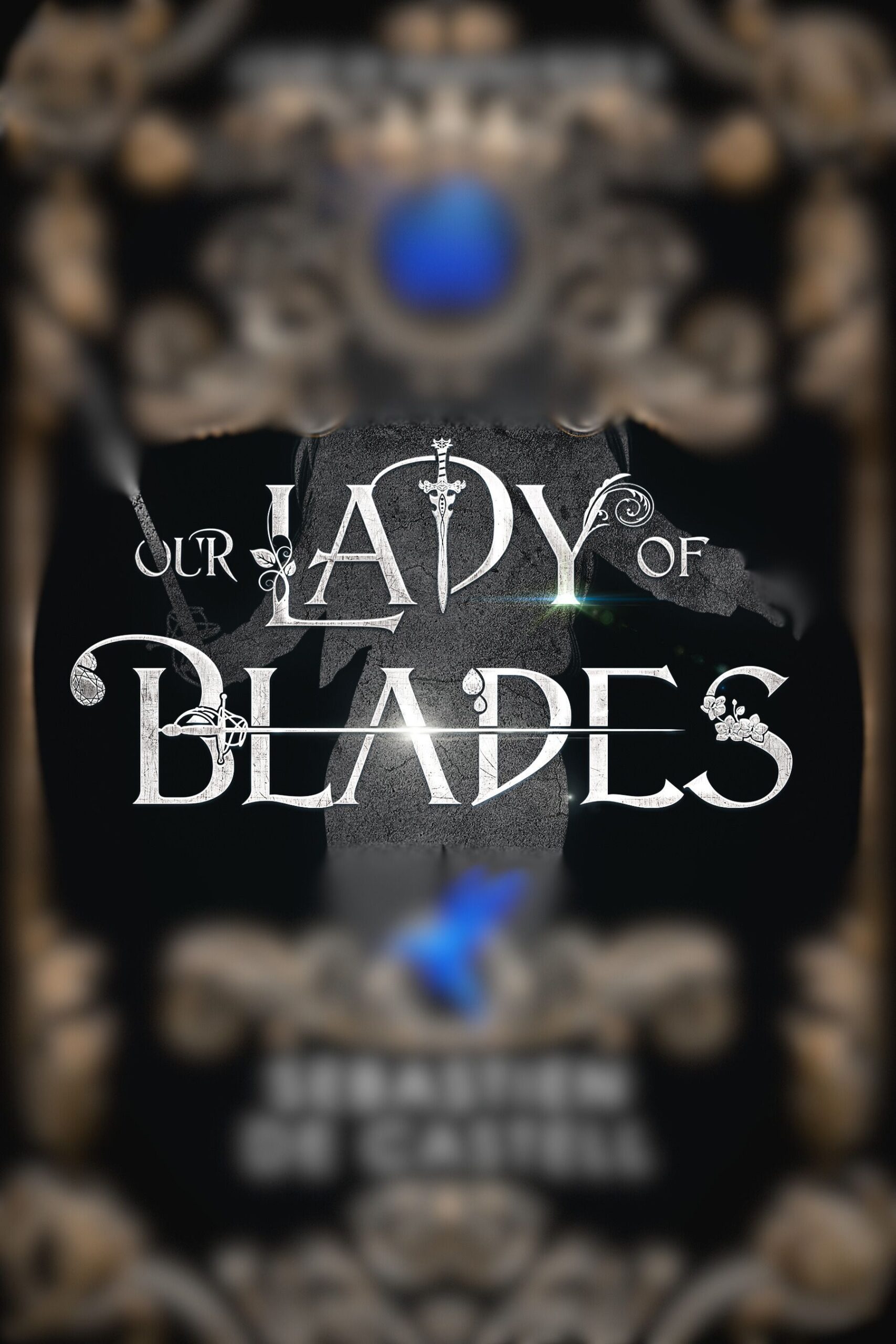
Our Lady of Blades is, without doubt, the most intricate book I’ve ever written. In fact, it’s taken more passes than I can count to pull off the endless narrative magic tricks that make the story so compelling for me to write.
Here’s the synopsis:
Rijou’s notorious Court of Blades is as corrupt as it is violent. Here, justice is bought and sold as lives are destroyed with impunity – all to serve the duchy’s Ascendant Houses as they consolidate power by orchestrating the entirely legal murders of those who oppose them.
Into this world of corruption a mysterious duellist arrives, daring to foil the schemes of her enemies and setting the duchy’s elites against each other. They call her Lady Consequence, but she once had a different name – years ago before her family was slaughtered and she was consigned to the prison mine known as the House of Tears. Now she has returned with the plan and the means to rescue her brother and restore their house.
But the secret forces who engineered the deaths of her family have plans of their own for this beleaguered duchy, and if Consequence hopes to defeat them, she’ll first have to prove her wits as sharp as her rapier, and truly earn the title of Our Lady of Blades.
The Keep Within
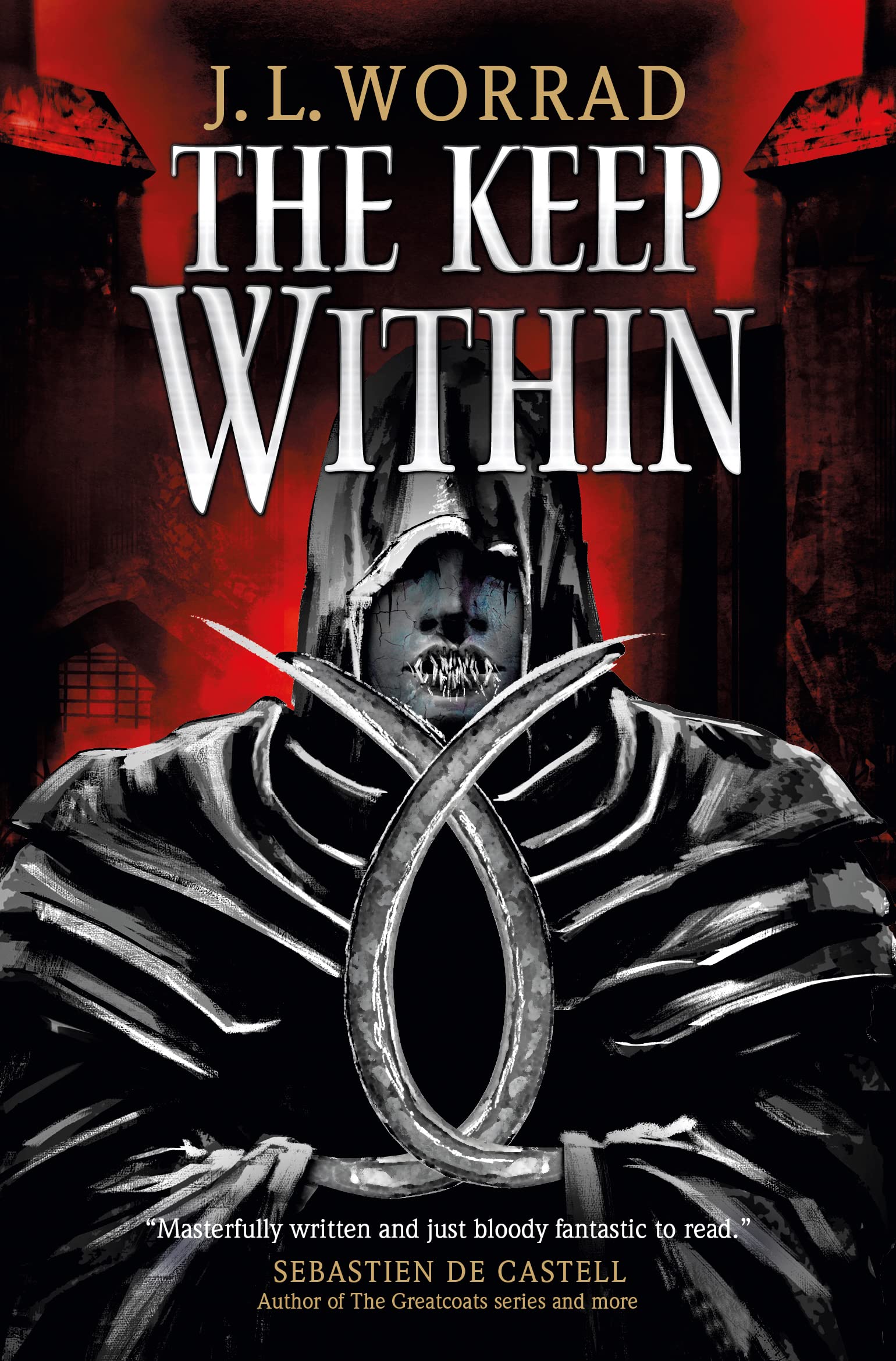
Packed with unforgettable characters, sharp wits, and wild plots, a bastard noble with dreams of the theatre and the ruthless first-queen are both caught up in a tangled web of murder and court intrigue in this savagely funny dark fantasy.
When Sir Harrance ‘Harry’ Larksdale, bastard brother of the king, falls for a mysterious lad from the mountains, he is unwillingly caught up in a chaotic world of court intrigue and murderous folk tales. Meanwhile Queen Carmotta Il’Lunadella, First-Queen of the Brintland, needs to save her life and her unborn child. With the Third-Queen plotting against her, and rumours of coups rocking the court, Carmotta can rely only on her devious mind and venomous wit.
But deep within the walls of Becken Keep squats the keep-within – patient, timeless, and evil. To speak of the keep-within outside the walls of Becken Keep guarantees your bizarre and agonising demise within nine days. All the while, people fearfully whisper the name Red Marie: a bloodied demon with rusted nails for teeth and swinging scythes who preys on the innocent.
Harry and Carmotta are clinging to their dreams, their lives, by threads. And, beneath all, the keep-within awaits.
Writing Fate of the Argosi
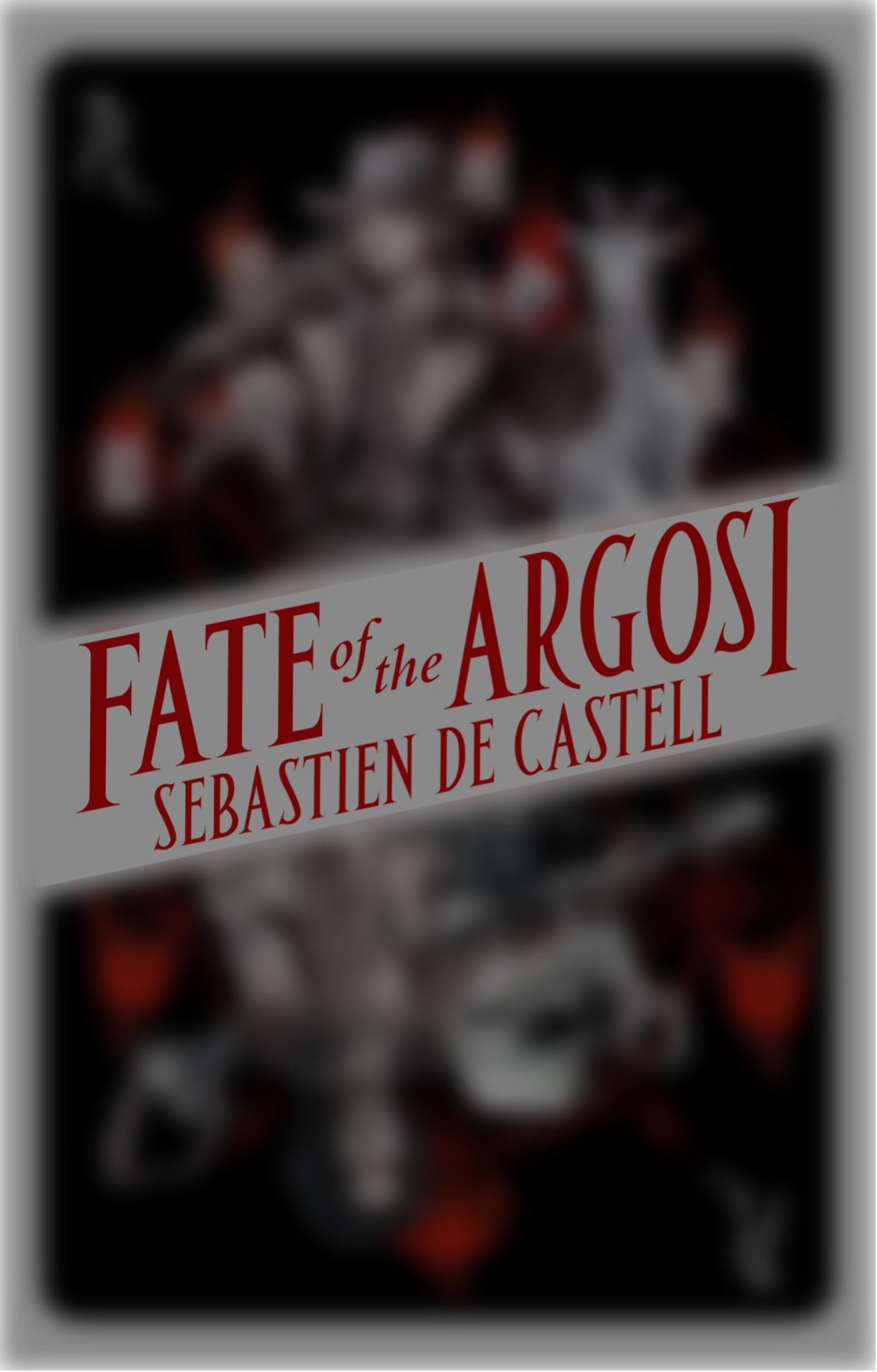
Fate of the Argosi is the third Ferius Parfax book, which is a prequel to Spellslinger. Without spoiling the premise too much, this instalment of young Ferius will see our beloved Path of the Wild Daisy return to her deck of disharmony cards to tackle her debts. But instead, she might just find more trouble than she’s bettin’ on…
There might also be something about a goat too, but you’ll have to wait and read it to find out…
And for those of you who don’t know, or haven’t read them yet, the first two books in this series are Way of the Argosi and Fall of the Argosi, which you should go and read, because personally, I really love those two books and getting to explore Ferius’ character as she is just so much swashbuckling fun.
Fun Writing Experiments
Writing experiments are always fun. Especially when they are coupled with friends like Miles Cameron, another Canadian novelist, and dear friend. During our last bout together, we tried to write a short story in an hour whilst in a hotel room in downtown Toronto. Suffice it to say, harsh deadlines aside, it was an amusing misadventure with surprising results!

In addition to writing, I have been doing a lot of promotional design work for The Malevolent Seven, and pre-orders for Coles. These are actually quite cool, as, if you order before May 11th, you will receive a signed, dedicated copy of the book, as well as a full set of ‘Wonderists’ Cards.
You can also order cool, special editions of the book from Inkstone Books, Goldsboro Books, and Broken Binding. I am very excited for the launch of this book as it is one I have wanted to write for some time and was able to dive deep into all the beloved mayhem of rogue mercenary mages whilst also delving into the cost such talents would have on the soul, which in turn created some rather colourful and even endearing characters.
I am also currently trying to teach myself to throw cards, as I write about it a lot. Alas, I’m not very good at it yet. I might need Ferius to give me some lessons. However, it’s quite cool learning about the various techniques involved and how to hold the cards in order to project them with deadly precision and speed.
I’ve also been working out a lot. For no particular reason, just, you know, it’s nice to get stronger as you age instead of the other way around.
In London and Edinburgh

So, my travels for the next several months include journeying to London for the launch of my latest book, The Malevolent Seven, in late May. I suspect the atmosphere of merry old London will be a little bit different this trip, in the wake of the new King’s Coronation, but it’s one of my favorite places to visit and I’m looking forward to meeting with my publishers, who are based there.
I will be attending the MCM Comic Con in London, which is taking place on the 26th-28th of May 2023. I’ll be joining them on the Friday.
I will also be attending the Forbidden Planet London Megastore for a Malevolent Seven book signing on Tuesday 30thMay, between 17:00-18:00 BST, which will be a lot of fun!
Then I’ll be heading up to the Cymera Festival in Edinburgh on June 2nd at 5pm for a lovely event. Hopefully, it will be warmer then. Did you know that Edinburgh Castle is built on an extinct volcano? I might have to steal that for one of my books.
And I may or may not be doing another little, secret event, if time permits…
Cycling to Castles

Most of my trip this summer will be done on bicycles, which have the dual virtues of being outdoors and of seeing things more closely and deeply than from cars or busses. I have a few upcoming novels and stories that need to feature some medieval-esque towns and castles, so France is always an excellent place to do research. I’ll also be spending a couple of days on the famed Mont St. Michel specifically for a book I’m writing that’s set in a similar monastery separated from the mainland by a causeway. So much opportunity for gothic fantasy there!
In Southern France

Travel has been a huge part of my life since I was a young boy. I drove $200 beater cars so I wouldn’t waste money that could better be spent on plane tickets and learned to love youth hostels and the sounds of other people snoring because it meant I could go on longer trips. My wife and I are a lot better off financially now, of course, so for the last ten years we’ve been able to travel as often as our schedules allowed. But of course, Covid came along and we’ve all been largely stationary for the past twenty months.
With the minor miracle of effective vaccines and the greater miracle of health officers making tough decisions, travel is starting to open up again. It’s not easy, of course, and there’s never an absolute guarantee of safety, but both the risks and the inconveniences of following COVID protocols are manageable for us now. So, we’re off to France, specifically, Dordogne.

Writing Our Lady of Blades
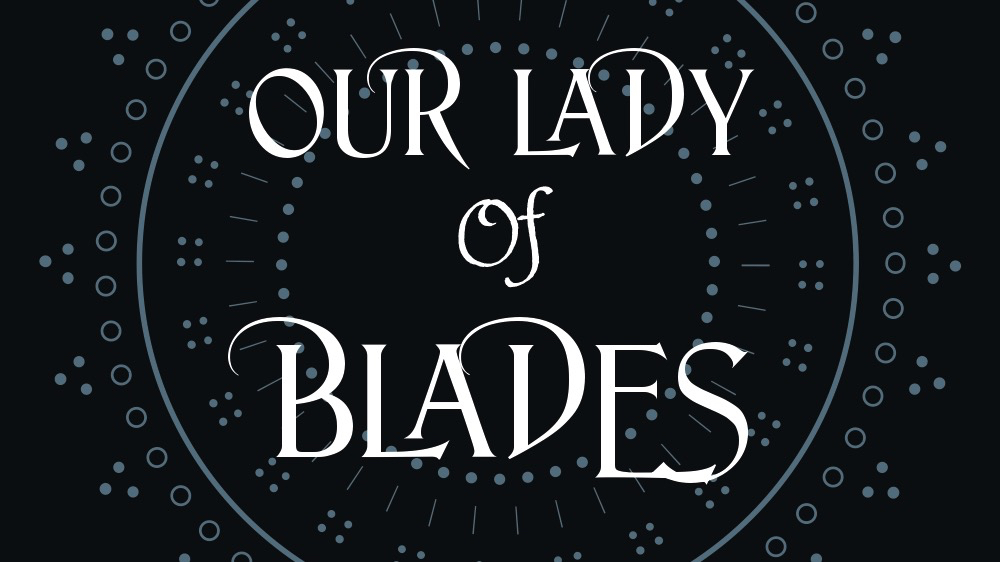
Our Lady of Blades is the first book in the Duellist Series.
Story Journals are where I talk about the writing of the books I’m working on. I update these with the latest content at the top, so start from the bottom if this is new to you.
August 2021 – A return to the Court of Blades
Our Lady of Blades is one of the novels on which I’ve spent the most time not only writing but in long stretches of just thinking about the book, its characters, themes, and all the complex intertwining plots. It’s a mammoth project, but one that is now ready to get done . . . I hope!
January 7th – An incomparable work of unimaginable genius . . . or a mess, I’m not sure which.
This is by far the most complicated novel I’ve ever written from a structural perspective. It’s turning into The Count of Monte Cristo meets The Sixth Sense. May need to u-turn here somewhere . . .
December – Oh, hell, what am I doing?
Wrote myself not so much into a corner as a long, dark, and very deep hole in the ground. Now attempting to dig myself out.
November 21st – First 19K words meet with Jo’s approval
One of my favourite things about writing Greatcoats novels is working with editor-to-the-stars Jo Fletcher. In addition to being monumentally experienced and skilled in this arena, she’s also incredibly patient with me, and frequently agrees to read things that are nowhere near finished. Long story short, we’re in agreement now that this new opening is headed in the right direction.
One interesting note: so far Our Lady of Blades has more resonances with Traitor’s Blade in terms of approach than any of my other novels. I kind of like the idea of a return to that style.
November 1st – A new opening . . . and new problems.
There’s a strong Count of Monte Cristo vibe in my new opening, which I love, but by starting the novel the way I am, with the main character as a mysterious stranger who comes to town with their own devious plan, I’m going against a ton of modern narrative conventions. “Save The Cat” this ain’t.
October 15th – An excellent false start
Wrote the opening to the book and it had all the flair and style I was aiming for: swashbuckly, quirky, and full of intrigue. There’s just one teensy-weensy problem: it doesn’t work. I have this entire outline which makes perfect sense and has all the right dramatic beats but I’m realizing now that if I go ahead this way I’m going to end up writing an unintentional YA novel. Don’t get me wrong, I love a great coming of age story, but that’s what Spellslinger is for and I don’t want to dilute that series or this one.
So . . . back to the drawing board.
October 1st, 2018 – Duels, duels, and more duels.
This book is in many ways the biggest challenge for me since I first wrote Traitor’s Blade. The Duellist is meant to be a new series but set in the world of the Greatcoats, but I don’t want to repeat myself, so that means navigating new territory without any assurance that fans of the original Greatcoats series will want to come along.
Artifact Space

I sometimes think every writer of military science fiction is secretly (some not so secretly) trying to write Horatio Hornblower in space. That would be terrific for me as a reader, since I loved the Horatio Hornblower stories of daring, honour, valour, and ingenuity overcoming adversity rather than brute force. Alas, I’ve never really found a science fiction series that gave me those same Hornblower vibes while offering a believable and intriguing context in which those adventures could take place.
Until now.
Artifact Space is what fans of Star Trek the Next Generation who’ve longed for something updated and more reflective of a diverse human society yet still holds to that same core of optimism and idealism about human beings have been waiting for. It’s filled with intriguing space ship troubles, conflicts large and small, the spirit of camaraderie one would hope we’d achieve when going into space, and yet with all the intricacies of our human foibles intact rather than glossed over.
The story centres on Marca Nbaro, a new midshipper on the Greatship Athens – a massive space faring vessel run not by a purely benevolent government but by a consortium of business interests inspired (one suspects) by Venetian mercantile culture. Marca has a troubled past, and the things she’s had to do to get a position on the Athens frequently leave her vulnerable to those out to get her. But she also finds friends aboard the ship, and a growing sense of purpose even as the near-calamitous situations she winds up in reveal her strengths.
Because I’m not a frequent reader of sci-fi (not because I don’t like the genre but because I often don’t quite get it due to my own ineptitude), I often find myself shunted out of a book because the science is either so sparse as to be magic or so lovingly rendered as to be a textbook about things that don’t work in the real world. Kind of like when you read a fantasy novel with four thousand houses, countries, shires, and whatever else and realize you’ve just memorized a history that won’t actually help you at all in your daily life. Artifact Space manages to find a path for the reader in which the science of space travel is balanced against an equally enticing and complex culture and economy. Yes, I meant that: the economics are actually interesting here. More importantly, Cameron never piles on so much at once that you find yourself lost amidst figures and facts about either space travel or the intricate human culture that’s achieved it.
Another aspect of Artifact Space I enjoyed was that – as one would expect on a massive ship hurtling through space – the book is somewhat episodic. It’s not one long, drawn-out singular problem (though there is a mystery that threads the entire narrative), but more the ongoing adventures of Marca NBaro and the crew of the Greatship Athens. If that sounds like a pitch for this to be a television series, it is; I really, really want to see this as a TV show that sits somewhere between Star Trek the Next Generation and The Expanse.
Anyway, enough gushing. Let me grind my axe against the insufferably talented Miles Cameron here a moment by saying I wish he’d added a glossary and dramatis personae to the book. Every acronym, concept, and character is explained, but if you glide over those parts, you’ll find yourself later wondering what the heck that term is they keep using every time they’re referring to the organization they work for or the ones it competes against. However, if you’re reading this review, then I can save you lots of trouble later on by advising that you pay close attention when terms and characters are introduced. Cameron doesn’t drop stuff in for the hell of it – everything will be meaningful at some point in the story.
Artifact Space is the beginning of what I hope will be a huge series, rich in characters and the textures of a space faring society. For those like me who want to read sci-fi but often feel like an outsider looking in when picking up a science fiction novel, Artifact Space is a welcoming delight.
In Vancouver for the Summer

British Columbia has done a pretty good job of managing the Covid-19 pandemic overall, but one consequence of that is accepting certain public health rules which, though not draconian by any stretch, nonetheless make you long for the halcyon days of going to movies and getting on airplanes.
Fortunately, as places to be stuck in go, Vancouver is a pretty nice place to spend the Summer.
The Devil and the Dark Water
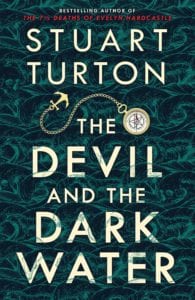
Historical Mystery Full of Twists and Suspence
The Devil and the Dark Water could almost be pitched as “J.J. Abrams’ Lost meets Agatha Christie’s Murder on the Orient Express set on a 17th Century ship”. Maybe the best way to review the book is to explain those elements.
Set on a 17th Century Dutch trading vessel filled with sailors, musketeers, and wealthy travellers, the characters are beset by the possible presence of an actual devil named Old Tom who, if the stories are true, can convince people to commit horrible murders and other crimes. The question of Old Tom’s reality or falsity is batted forth continuously both by events on the troubled ship and by the characters themselves, which is what gives the story that “Lost” quality. And while Stuart Turton gives us a more satisfying conclusion to his tale than J.J. Abrams ever did with his TV series, it’s impossible to make such an ending fully live up to all the suspense.
An equally compelling aspect to the story, however, is the Orient Express comparison: The Devil and the Dark Water features a rich cast of characters who at first appear to be brought together by chance but we soon realize there are hidden reasons for their presence. This adds to the tension because we don’t know who to trust, and when compounded with the powder keg of the sailors and soldiers on board constantly being at each others’ throats, makes for a suspenseful read.
Arent Hayes, the protagonist, is a compelling character – not least because he’s presented as the sidekick of Sammy Pipps, a Sherlock Holmesian figure who is also a captive on the ship and thus Arent is forced to do the detecting for once. Sara, the other main character, is equally engaging as a woman whose own cleverness and compassion have too long been chained by a cruel husband and society, at last unleashed to put her gifts to use.
I won’t say much more here. The Devil and the Dark Water entertainingly blends classic detective fiction, an intriguing historical setting, and the kind of you’re-never-sure-what’s-really-going-on storytelling style that happens to be one of my favourites. Turton’s first book, The Seven and a Half Deaths of Evelyn Hardcastle, was an excellent read, and I’m pretty sure I’ll pick up whatever he writes next. There aren’t a lot of storytellers like Turton out there, and I wish there were more.
THE BLURB:
It’s 1634 and Samuel Pipps, the world’s greatest detective, is being transported to Amsterdam to be executed for a crime he may, or may not, have committed. Travelling with him is his loyal bodyguard, Arent Hayes, who is determined to prove his friend innocent.
But no sooner are they out to sea than devilry begins to blight the voyage. A twice-dead leper stalks the decks. Strange symbols appear on the sails. Livestock is slaughtered.
And then three passengers are marked for death, including Samuel.
Could a demon be responsible for their misfortunes?
With Pipps imprisoned, only Arent can solve a mystery that connects every passenger onboard. A mystery that stretches back into their past and now threatens to sink the ship, killing everybody on board.
Writing Fall Of The Argosi
FALL OF THE ARGOSI is the second book in the Argosi Series.
SPOILER WARNING!
Story Journals are where I talk about the writing of the books I’m working on. They’re my daily thoughts after writing whatever chapters I was working on at the time, which means inevitably there will be spoilers in here – including, potentially, the climax of the book. So I urge you not to read this if you’re worried about spoilers.
Day 001 – Starting Out Is Scary
I was interviewed for a Russian fantasy magazine recently, and one of the questions was about which part of a book do I find the easiest to write. I said the beginnings, because that’s always been true in the past. But now that I’ve been writing every day, always knowing I have to finish the books I start, that’s actually changed for me.
The problem with beginnings is that they define everything that follows. Start at the wrong point in the story, and chances are you’ll be rewriting every chapter to fix it later. Start with the wrong tone and the entire mood of the book changes. Fail to signal the genre, the voice, the style, or just about anything else, and you’ll end up heading down a road you may not like.
Other writers have a different view of this, I know. Lots of people refer to the “shitty first draft” and how none of it matters, but I’ve never been that way. I have to get the opening right, and I’ll keep going over it again and again until I do.
So, starting out the first chapter of Fall of the Argosi took me quite a while, because I had to decide what was backstory and what was part of the action of the story. In the end I think I’ve got something suitably engaging that will make readers want to turn the page.
Of course, it’s always easy when you open with zombies.
Day 002 – Allowing the Unexpected Within the Already Decided
I knew that the second chapter was going to have to be a fight scene, and the third would likely entail Ferius having to figure out how the little boy ended up in the desert in the first place. But what’s nice about the writing process for me lately is that even within those anticipated scenes, lots of new directions crop up. That’s what happened today, and I’m happy with how chapters 2 and 3 turned out.
Day 003 – Narrative Devices
Two chapters in a row here that have to handle dialogue without the usual conventions because one of the characters speaks a kind of sign language the other is learning. It’s kind of a weird thing to have to sort out in terms of what those translated sentences would look like. Hoping it all holds together . . .
Day 004 – Wheel Spinning
I really am awful at transitional scenes. The more I try to imbue them with meaning, the more it feels like needless self-reflection on the part of the characters. In this case, I’ve set myself up for even more transitional scenes. Have to see how this all works out tomorrow.
Day 005 – Sometimes the Wheels Turn in Interesting Ways
I figured these next two scenes would be dull because there wouldn’t be any big action, but taking a cue from Elmore Leonard (or maybe it was Alfred Hitchcock), I pulled the old “tell the reader there’s a bomb under the table” trick (which is odd to do when you’ve got a first person narrator). In this case, though, it worked out nicely and there’s lots of suspense in these two scenes.
Day 006 – When Easy Scenes Aren’t
Yesterday I’d been worried about two scenes that weren’t obviously “exciting” ones and therefore would be hard to make engaging, yet they turned out great. Today I had two scenes which are self-evidently exciting (trying to escape from zombies should always make for fun action to write) and yet I struggled to get somewhere interesting with them. In fact, I’m pretty sure I’m going to have to do a rewrite on them pronto.
Day 007 – False Starts
So I had a false start today. These can be confusing because on general principle you want to trust your writerly instincts and assume they’re leading you somewhere interesting. In this case, however, they were taking me down a road that really didn’t move the sequence along. So, after messing with the chapter for an hour, I tossed it out and took a new route. That one, I think, worked a lot better, and now I’m ready to get to the end of this first act.
Day 008 – Ending Act 1
I always enjoy getting to the end of an act. It feels like something real’s been accomplished – something that means one part of the story is genuinely done. The trouble, of course, is that it’s also a time to reflect on whether you’ve really set up what comes next. It’s not enough to know what the “overall story” is about at this stage (e.g. “Hunting a murderer”). We need something that genuinely propels the story forward.
In my case, I haven’t entirely set up the next act. In other words, this act closes nicely, but opening the next one will be tricky. Time to get to work, I guess.
Day 009 – Beginning Act 2
So today is when I pay for yesterday’s mistakes (as is so often the case.) Because I haven’t set up an obvious direction for act 2, I need to get that done in this chapter, which is always harder than having set it up before and allowing the opening of the new act to take you somewhere directly and skip the stuff in between. So maybe I need to go back and fix the previous chapter first . . . Hmm . . . yeah, might need to do that.
Day 010 – Stress in Writing
As a writer, I never think of myself as having trouble coming up with ideas. I come up with ideas all the time. Show me any newspaper story and chances are I’ll think, “That gives me an idea for a novel.” I have this same reaction watching any television show or movie where an actor does one thing and my brain shudders and says, “It could’ve gone a different way. What if . . .”
But that’s the illusion I think a lot of us live under: that those ideas are the same type of ideas as the ones that answer, “what needs to happen next in this book?” when in fact the two have almost nothing in common. Trying to decide on the next chapter can be gruelling. First, it’s not uncommon for me to have noideas where to go next. Second, when I do have those ideas, I’m not sure if they’re the best ones or just the ones that came easiest to me. For reference, an “idea that comes easily to a writer” is also a decent definition for the word “cliché”.
Anyway, none of that matters. In the end, there’s only the book and the characters and you have to let the story move forward. During my tougher writing years (of which there have been a remarkably high number given the short length of my career thus far) I’d get lost for days or weeks without pushing forward. This year, by writing everyday and writing one draft of a novel each month, I’ve been able to compress those days or weeks into a few hours.
But man, those hours really suck.
Day 011 – The Red Nuns
I wasn’t sure how to approach this enigmatic order of nuns in the mountains. The risk, of course, is creating the same sorts of characters we’ve seen dozens of times before. One virtue of discovering character through dialogue, however, is that it’s often easier with the things people say to go against the grain than it is with their actions. So just starting out with the gatehouse keeper’s mixture of being all smiles while saying horribly rude things to Ferius took me down a path that defined the order of red nuns in a way I’m quite happy with.
Day 012 – The Mothers Superior
By yesterday I’d had a few ideas about how to approach the leaders of the convent, and today those shaped up nicely. I wanted to make them feel genuine without having them be positive characters relative to Ferius. Now they’re kind of strange, manipulative in an interesting way, and utterly determined to protect their convent. So all that’s worked out. Tomorrow, however, I have to write Ferius recounting what happened between her and Enna, which might be a challenge to get right.
Day 013 – Ferius’ Shame
Originally I’d planned these chapters to take place in the first Ferius book, but the timing didn’t quite fit. Having them here works better, I think, but I might need a second pass to get the emotional impact as strong as it needs to be. I’ll also need to see how these revelations inform what comes next.
But that’s tomorrow’s problem. For now, I’ve got lots of compelling scenes and I’m on track with the progression of the story, and that’s what’s most important.
Day 014 – The Red Nuns
Wow, but it’s hard writing a scene with nine characters all talking, with seven of them being characters with only vague names and descriptions that we’re not likely to see again . . .
Day 015 – I Knew It: Rewriting Time
There was plenty of good stuff in my last chapter with the Red Nuns, but I botched the nine characters on the page thing and beyond that, had them in the same location too long (this is a failing I often have: dragging out loads of dialogue and revelation inside the same static location). So I had to do a rewrite, split the chapter in two and going to a new location to allow for a bit more lore and increase in tension. That itself is a bit of a lesson for me: you can increase the tension in dialogue and exposition simply by moving the action to a more relevant location.
Anyway, after all that, the section now ended up 1300 words longer, but somehow the overall effect feels tighter and better paced. Sometimes not differentiating characters enough can tire the reader and make things seem long or slow when they’re not.
Day 016 – Building Up Suspicion & Making New Problems
Never end on a static note. That’s a lesson I need to learn one of these days. In this case, I end on a wonderfully tense note of suspicion between two characters, yet there’s no obvious place the story has to go next. In other words, I’ve created a static ending to the act. That never works out well.
My choices now are have a chapter building up this suspicion and then have the external world come crashing on the characters, or alter my last scene to do it there. Not sure what’s the right choice yet, but will have to try something right away.
Day 017 – Am I Stretching My Chapters Out?
I’ve noticed lately my chapters seem to be getting longer. Part of me wonders whether this comes from a subconscious desire to get all my words for the day (roughly 2500 a day for this book) all in one chapter rather than two or three. It’s a dangerous thing because the last thing I want to do is stretch out scenes just to fill pages. I’ll have to be mindful as I go through the rest of the book.
Day 018 – Digging Through the Mountainside
I often characterize the process of writing a novel as going on a journey through a long, dark forest. If you’ve never done it before, it’s especially harrowing because you have no idea where you are in the forest. So you’ve written a hundred pages. Are you a halfway through that forest? Will another hundred pages see you to the other side? Or will you end up even more lost with no end in sight?
The analogy holds up until you’ve been through that forest enough times that you no longer consider visiting it as being much of an adventure. In other words, there are some novels you just know how to write, but to avoid repeating yourself, you stop walking through that same forest and instead look for a new one. The problem is, there is no other forest. If you write something new, you have to start digging through the mountains on either side of that forest. That’s what one’s tenth or twentieth (I think I’m on my twenty-first novel now) becomes: digging through rock to get to the novel you’re trying to write.
Sometimes the digging is easy, the progress steady. Other times, you just hit one hard section of rock after another. You have to keep trying to dig, back away for a second, and try to dig that same patch again.
That’s where I am in the story. Today I wrote a scene that I’m almost positive will need to be rewritten tomorrow. Chances of being right: 100%
Day 019 – Yep. More Rewriting
Took forever to get these scenes in order. I finally got there, though, turning the one chapter into two and building up the suspense a little better. Of course, tomorrow I’ll be back to burrowing into the rock trying to make more progress.
Day 020 – The Impossible Escape
So in my previous two chapters I basically set up a scenario where Ferius can’t envision any means of escaping the horde of plague-infected nuns. There’s just no way out. Rosie claims if Ferius will trust her completely, then she can save her and Binta. Today I have to write that scene. The only problem is I have no idea how it’s going to work.
Time to dive in . . .
Day 021 – Completing the Red Nun Sequence
Surprisingly, most of what I wrote yesterday kind of worked, and led me into the solution for the first major confrontation with the Traveller. What’s holding this book together right now is less the adventure stuff – which is what I thought I had sorted out before I began – and more the twists and reveals. There’s an unexpectedness to a lot of the way the chapters end, which is interesting for me because they’re coming up naturally without me consciously intending to go in that direction.
Day 022 – Hmm . . . a Love Scene?
There’s nothing quite so risky as a love scene in a YA novel written by someone who pretty much studiously avoids writing love scenes. And yet, it just felt like this was the necessary character development at this moment in the story. Fortunately, it turned out surprisingly well, and is tame enough that I’m hoping it gets past the Russian censors.
Day 023 – Short Transition
Just wrote a short transitional scene here, partly because I’m not quite sure where I’m going next. Tomorrow might be tough . . .
Day 024 – Rosie’s Story
It’s strange to launch into a character’s story when you have no idea what that is. However I kind of like the general shape of her backstory here. Unfortunately, I have a suspicion I’ll need to more elegantly restructure it tomorrow.
Day 025 – Restructuring
Sure enough, I needed to restructure Rosie’s story. Not sure how well it’s turned out with what I’ve done. Will have to see how I feel in the morning about this.
Day 026 – Building to Rosie’s Hidden Plan
Not sure if I’ve got this stuff right, but I’m moving towards the idea that Rosie’s basically been gradually preparing Ferius for something terrible and that’s why she’s been telling her about her own life. Have to see if that’s actually making sense tomorrow.
Day 027 – Yet Another Rewrite!
I hadn’t thought that the narrative device for this sequence – interspersing Rosie telling her story with scenes of the characters trailing after the Traveller – would’ve been problematic, but somehow the sequence felt too static. So yet again I had to rewrite some of this to both split up expositional scenes and have a bit of action.
Technically this brought me to the end of Act 3, though I’m not entirely sure if that’s correct or if things will be restructured later.
Day 028 – Beginning of Act 4
Well, if I wasn’t sure whether the previous chapters truly ended Act 3, this definitely feels like the beginning of Act 4, with Ferius forced to take on a role and a path she doesn’t want.
I have three days left in this draft, which is enough to probably get through the climax but adding the epilogue is going to be tricky. Basically I need to get to the big tragedy next along with the reunion, then tomorrow the climax, and finally the epilogue.
Day 029 – All Is Lost
(Not in the book . . . well, yes in the book, but I don’t mean the book is lost, but that’s the section I need to write today.)
Today’s going to have to be a big writing day so that I can get to both the big awful moment (which I don’t quite know what that’s going to be yet) and the moment of rebirth (which I do, but I’m not entirely sure how to handle it.)
Okay . . . to work!
Day 30 – Rebirth
Rebirth is always an interesting part of a book for me – the point where the main character has to rise up from the dust, transformed and ready to face the final battle. In many ways it’s the most emotional part of a novel for me.
With this particular rebirth, I always knew it was going to involve Enna appearing on the scene, telling Ferius what she needs to hear.
And now . . . the climax.
Day 031 – The End
I love hitting the end of a book. This one was pretty tough, and I left myself with an awful lot to write in one day. I wrote over 6500 words, and still I think that climax could be expanded somewhat. But that’ll be for after my editor reads the manuscript and weighs in.
After this will come the editor’s notes followed by a revised draft which then gets approved and moves into copyedits, proofs, cover art, interior art, and at last a book in my hands!
Of course, now I have to come up with a plan for a new book starting tomorrow . . .


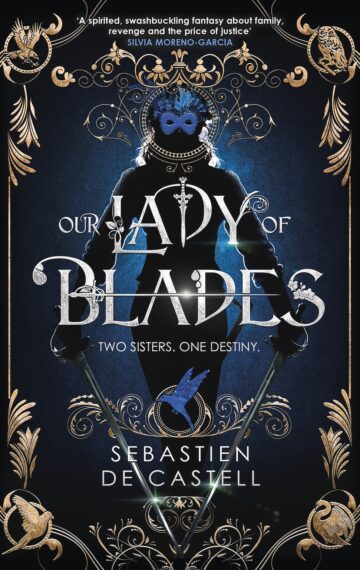
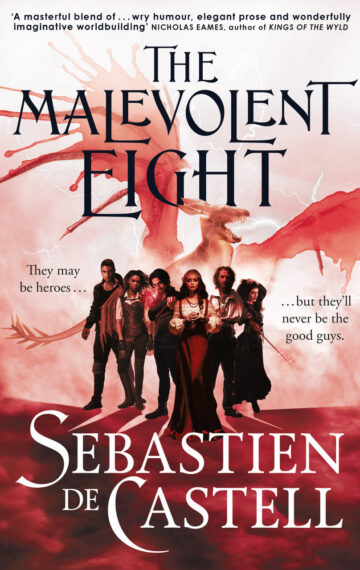
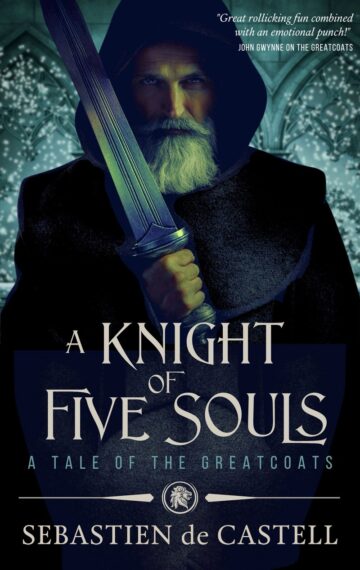
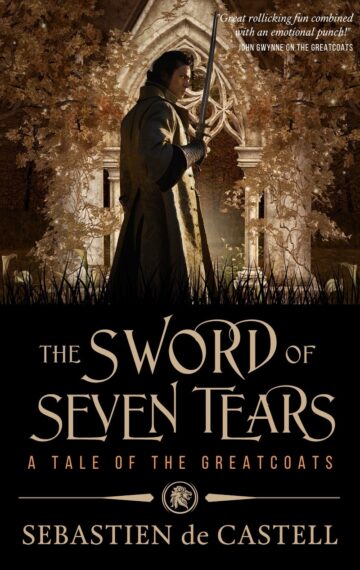
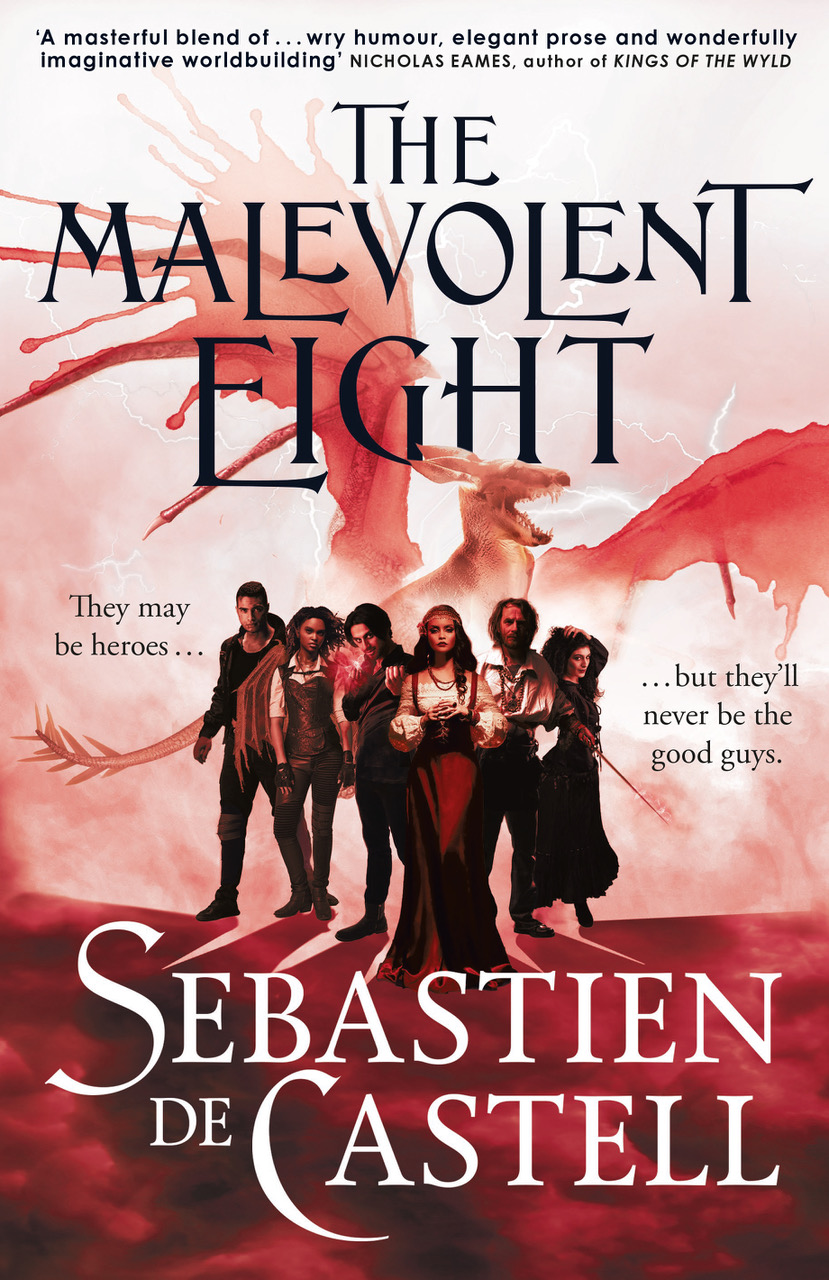
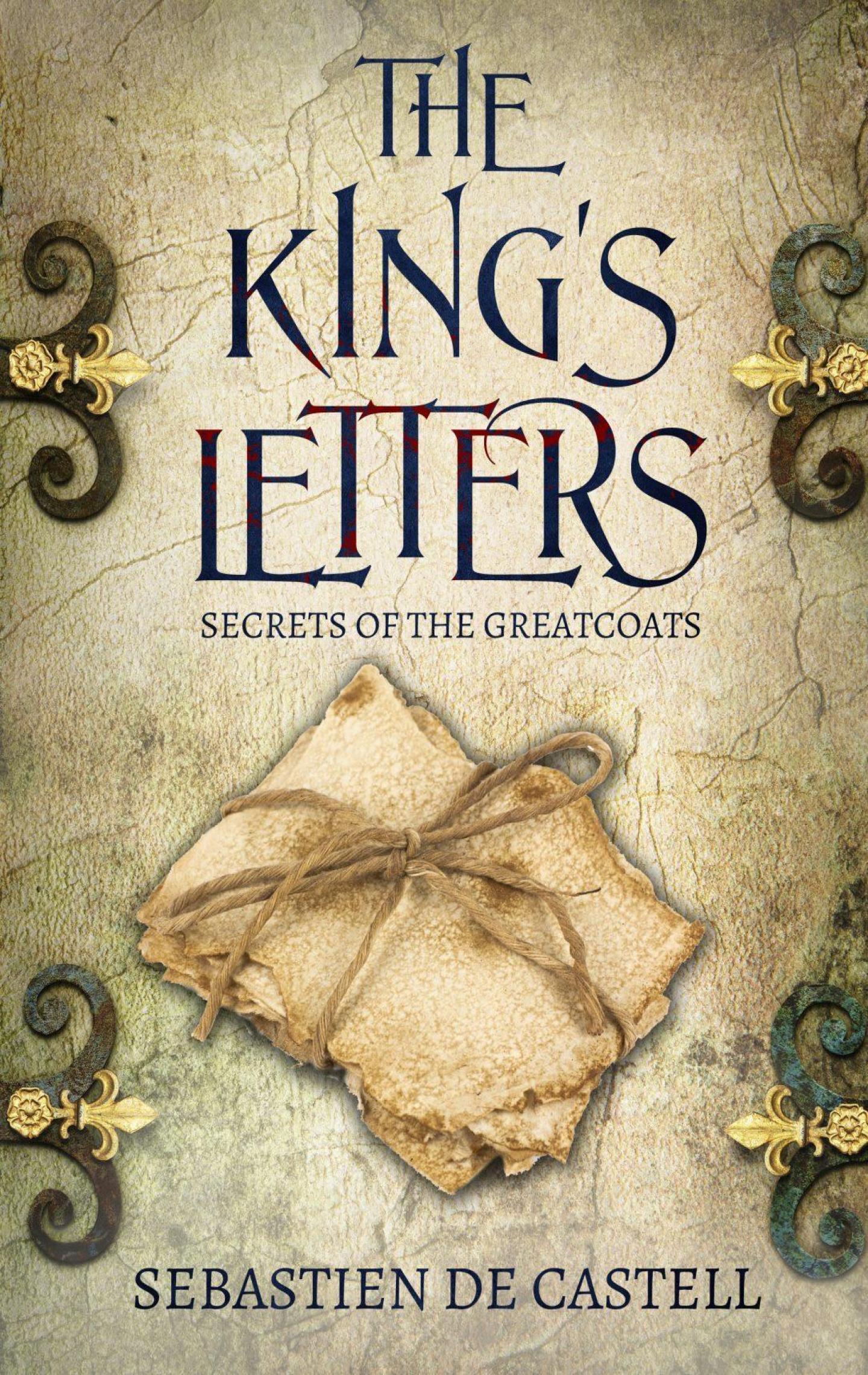
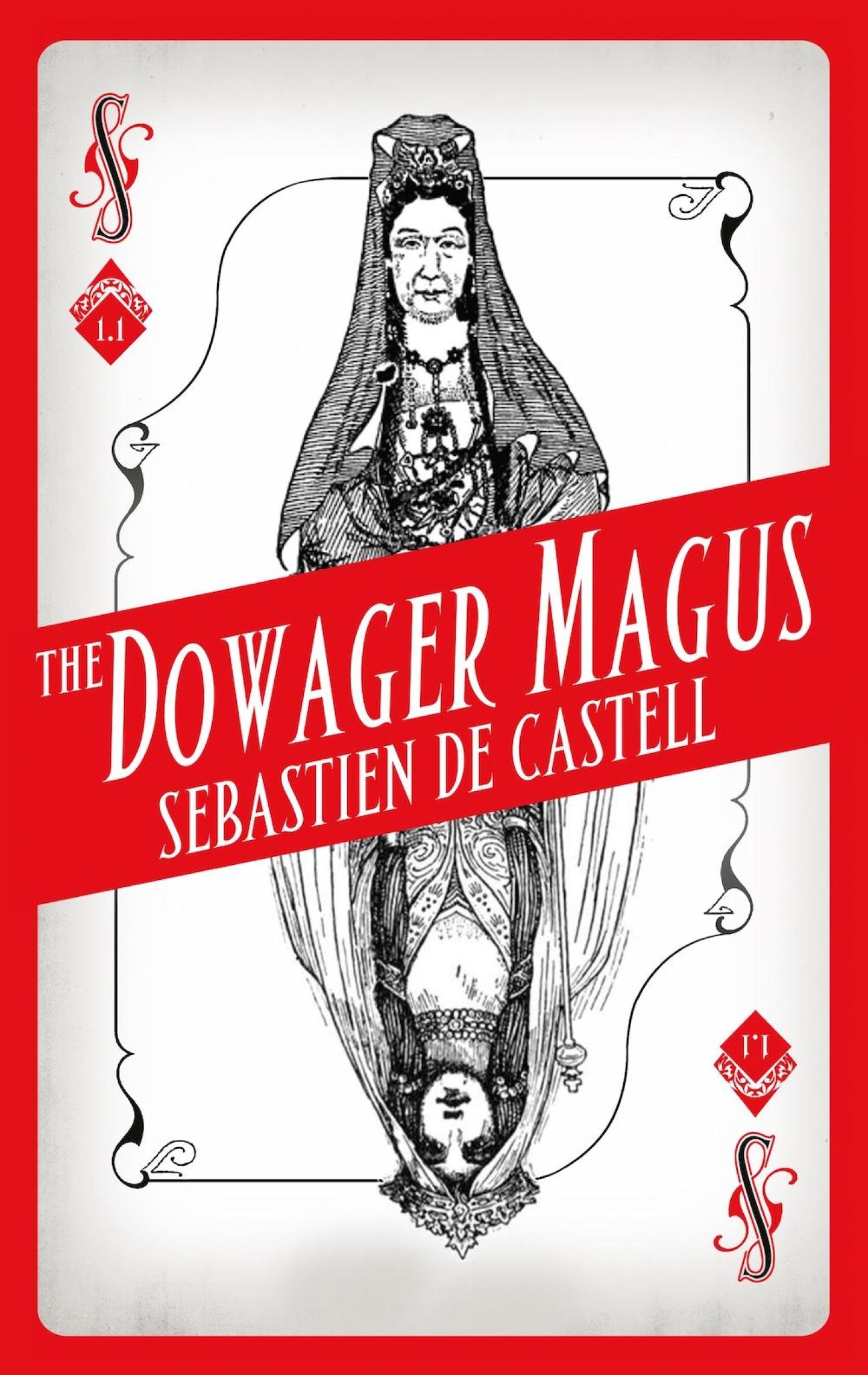
 Les vieux maîtres de sort aiment raconter que la magie a un goût. Les sorts de braise ressemblent à une épice qui vous brûle le bout de la langue. La magie du souf e est subtile, presque rafraîchissante, un peu comme si vous teniez une feuille de menthe entre vos lèvres. Le sable, la soie, le sang, le fer… cha- cune de ces magies a son parfum. Un véritable adepte, autre- ment dit un mage capable de jeter un sort même à l’extérieur d’une oasis, les connaît tous.
Les vieux maîtres de sort aiment raconter que la magie a un goût. Les sorts de braise ressemblent à une épice qui vous brûle le bout de la langue. La magie du souf e est subtile, presque rafraîchissante, un peu comme si vous teniez une feuille de menthe entre vos lèvres. Le sable, la soie, le sang, le fer… cha- cune de ces magies a son parfum. Un véritable adepte, autre- ment dit un mage capable de jeter un sort même à l’extérieur d’une oasis, les connaît tous. 'I totally saw this coming,’ Reichis growled, leaping onto my shoulder as lightning scorched the sand barely ten feet from us. The squirrel cat’s claws pierced my sweat-soaked shirt and dug into my skin.
'I totally saw this coming,’ Reichis growled, leaping onto my shoulder as lightning scorched the sand barely ten feet from us. The squirrel cat’s claws pierced my sweat-soaked shirt and dug into my skin. The way of the Argosi is the way of water. Water never seeks to block another’s path, nor does it permit impediments to its own. It moves freely, slipping past those who would capture it, taking nothing that belongs to others. To forget this is to stray from the path, for despite the rumours one sometimes hears, an Argosi never, ever steals.
The way of the Argosi is the way of water. Water never seeks to block another’s path, nor does it permit impediments to its own. It moves freely, slipping past those who would capture it, taking nothing that belongs to others. To forget this is to stray from the path, for despite the rumours one sometimes hears, an Argosi never, ever steals.